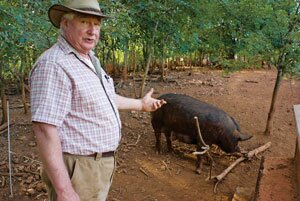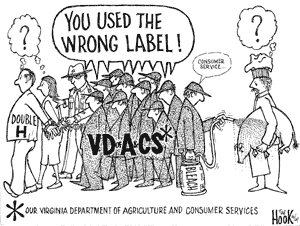 Richard Bean raises pigs for slaughter on his Nelson County farm. Last week, he and his partner Jean Rinaldi were arrested for putting old labels on their pork products.
Richard Bean raises pigs for slaughter on his Nelson County farm. Last week, he and his partner Jean Rinaldi were arrested for putting old labels on their pork products.
PHOTO BY JAY KUHLMANN
Back in Massachusetts, says Jean Rinaldi, Richard Bean was her butcher for over 20 years. When changing fortunes and divorces finally brought them together, they decided to pull up roots and start their own small farm in rural Virginia. When she was buying her pork chops from Bean all those years ago, it was hard enough imagining him as her future partner, she says, much less anticipating being arrested with him for putting the wrong labels on their products.
But that's what happened on Friday, September 21.
Bean, 62, and Rinaldi, 60, owners of the Double H Farm in Nelson County, were arrested for violating several FDA regulations. At the same time, state agents seized Double H pork products from area restaurants, and "denatured" or bleached, an entire roasting pig (to render it inedible) at the South African restaurant Shebeen, according to Rinaldi.
The couple were released on their own recognizance and appeared in Charlottesville District Court Friday, September 28, to learn that their case will be heard October 25. They were back selling their produce at the City Market the next day, where they sold out, Bean reports, thanks to support from customers who had heard about the arrests.
The news of the arrest came as a shock to many restaurant owners and supporters of the local food movement– often called the "slow food" movement– who trust Double H.
"These charges, to my knowledge, do not arise from any complaints on the part of people who have purchased and eaten Double H products," wrote local food activist Erika Howsare on a forum. "They represent a decision on the part of the state of Virginia to target two people who happen to be outspoken advocates of small farmers' rights."
Upscale restaurants buying their food include Hamiltons', Fleurie, Revolutionary Soup, and Café Feast.
"It was pretty scary," says Revolutionary Soup's Will Richey. "We don't buy pork products from them, but we heard that agents were going around checking restaurants."
However, no one appears more shocked than Rinaldi.
"I never would have dreamed that the government was so controlling," she says, describing 10 state agriculture agents, one state trooper, and a Nelson County sheriff showing up at her farm, arresting her and Bean, seizing their computers, and placing the couple in separate cars. "It was terrifying."
"We're aware of the situation," says Elaine Lidholm, communications director for the Virginia Department of Agriculture & Consumer Services, when asked about the arrests. Lidholm explained that State Police, not the Department, conduct arrests in such situations, but she declined to elaborate. "We don't speak about active cases," she says.
According to Rinaldi, state agents have been "harassing" the couple for a year, and she calls the arrests "overkill." Specifically, Rinaldi describes one agent following Bean around town as he made deliveries, constantly pulling him aside at the Nelson and Charlottesville City Markets, and showing up unannounced at their farm.
The charge? "Distributing uninspected pork products to defraud," reads the one felony charge. "Using the wrong labels as price tags," explains Rinaldi, who concedes the labels say "certified organic" even though the pork isn't "officially" certified.
"We hadn't got the new ones in yet," she says. "They just don't like that we were processing the pigs ourselves."
Indeed, transporting uninspected pork, goat, and sheep products is illegal in Virginia. The two farmers were attempting to comply, she says, driving their pigs to a processing plant in Fauquier County, but it was costing as much as $1,300 for four pigs. "We're not rich," she points out.
"Seems to me, as soon as you comply with one regulation, they come up with another," Rinaldi says. "We've recently been told we can't sell our homemade bread or watermelons at the City Market, either. When was the last time you heard about a case of salmonella poisoning from a piece of watermelon at a city market?"
"Using the old labels was a knucklehead move on our part," admits Bean, acknowledging the "rule is still the rule, even though it may be wrong.
"But," he adds, "it was certainly not an attempt to defraud anyone."
Bean, who just finished a term as president of the Virginia Independent Consumers and Farmers Association, an organization dedicated to promoting "farmer-to-consumer trade," says he had been expecting the arrests, and he hopes their court case might be a chance to change the rules, which he thinks are unfairly applied to small farms.
"Taking action against them for those alleged violations, when there were no complaints of quality or food safety, is ludicrous," says Kathryn Russell, who runs nearby Majesty Farms. "The same meat that is safe if they give it away, is illegal being sold. Yet only a fraction of the meat sold each and every day in supermarkets and restaurants is actually actively inspected. Food imports from foreign sources are rarely inspected."
Coincidentally, the arrests happened around the same time as a recall of 21 million pounds of ground beef-- one of the biggest meat recalls in history-- from the New Jersey-based Topps Meat Company. The company realized their hamburger patties might be contaminated with a strain of E. coli bacteria, and a statement from the U.S. Department of Agriculture said that 25 reports of illness are under investigation in Connecticut, Florida, Indiana, Maine, New Jersey, New York, Ohio, and Pennsylvania.
Bean alleges that deadly bacteria strains are a byproduct of the way animals are treated on corporate farms. "They're not being fed the way their bodies are supposed to be fed," he says. "They're hopped up on steroids and fed corn."
Bean says the best way consumers can protect themselves from tainted or contaminated food is to know their supplier.
"I try not to blog angry," writes local blogger Waldo Jaquith. "But it has been two days since I first wrote about this, and I'm only getting madder. Here's hoping some enterprising reporters will dig into this story, finding out how these anti-farming laws continue to exist and who in the General Assembly will work to repeal them."

#